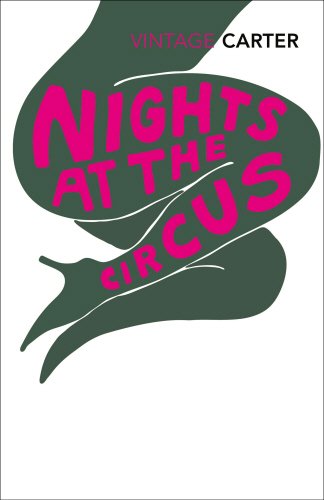 When you start a book by Angela Carter, there's only one thing that's certain: you have no idea what you're in for; nothing's too crazy, nothing's too bizarre. And of course, that's why you love Angela Carter. Okay, scratch that. That's why I love Angela Carter.
A story partly inspired by the myth of Leda and the swan, Nights at the Circus is a dazzling story about Fevvers, the winged aerialiste, who's bamboozled the world, and has everyone questioning if the wings are real, or a mere trick.
When you start a book by Angela Carter, there's only one thing that's certain: you have no idea what you're in for; nothing's too crazy, nothing's too bizarre. And of course, that's why you love Angela Carter. Okay, scratch that. That's why I love Angela Carter.
A story partly inspired by the myth of Leda and the swan, Nights at the Circus is a dazzling story about Fevvers, the winged aerialiste, who's bamboozled the world, and has everyone questioning if the wings are real, or a mere trick.
The story starts in London in 1899, in Fevver's dressing room, where Jack Walser - an experienced journalist - is interviewing Fevvers. As she recounts the story of her life - being born (or hatched from an egg), abandoned by her real parents; and brought up in a brothel, having an ordinary childhood, her wings sprouting as she hit puberty - Walser is enamoured, as is the reader. However, every now and again, an element of doubt creeps in: how much of this story is fabricated, how much is real?
As she continues her tale, of how she ended up at the circus, as an aerialiste, she weaves a magic tale, which is totally unbelievable but still makes you wonder... could it be?! Walser, still in search of the truth, at the end of the first section, decides to go undercover, and join the circus act as a clown.
The grand imperial tour takes the protagonists to Petersburg, where the action actually commences, as opposed to London, where it was almost like a long monologue from Fevvers, with very few interruptions from Lizzie (her adoptive mother) and Jack. In Petersburg though, the story becomes downright incredulous (yes, even more incredulous than the first bit!). The tale that Carter weaves, the imagery it evokes, the scenes from the circus act that are detailed - it's all breathtaking.
Outside the window, there slides past that unimaginable and deserted vastness where night is coming on, the sun declining in ghastly blood-streaked splendour like a public execution across, it would seem, half a continent, where live only bears and shooting stars and the wolves who lap congealing ice from water that holds within it the entire sky. All white with snow as if under dustsheets, as if laid away eternally as soon as brought back from the shop, never to be used or touched. Horrors! And, as on a cyclorama, this unnatural spectacle rolls past at twenty-odd miles an hour in a tidy frame of lace curtains only a little the worse for soot and drapes of a heavy velvet of dark, dusty blue.
...And then there's the characterisation; rich characters, with colourful histories and overwhelming personalities. Take Mignon, for example:
She had the febrile gaiety of a being without a past, without a present, yet she existed thus, without memory or history, only because her past was too bleak to think of and her future too terrible to contemplate; she was the broken blossom of the present tense.
In the world of Angela Carter though, her luck does take a turn for the better, and one does believe that there can be happy endings. At least, for a few moments. But as we continue in the surrealistic world so artfully conjured up (am I gushing?), a tiger must be shot, a murder attempt is made during an act, and Fevvers continues to astound everyone (and eventually get herself in trouble), while Wolser is no closer to determining the veracity of her story.
As the show wraps up in Petersburg, and moves on to the bleak forests of Siberia, the narrative continues in its bizarre vein, where a railroad "accident" caused by the outlaws has resulted in memory-loss striking a chief character, the circus disintegrating, but the protagonists looking forward to the turn of the century as a sign of hope, and new things to come. It's that last line though, that confuses the living daylights out of me, and makes me re-question everything I've read in the book. I read this book about a month back, but the mind still boggles; the implications are still hazy.
Magical realism at its best, the strong female characters - an anomaly in the nineteenth century, the sexuality and the sheer madness of it all is fantastic. You question everything, deliberate on each sentence, try sizing up the characters, but there is no stereotyping them. It's a parody on all the fairy-tales you know and love; it's inspired by all the myths that don't add up, but still exist in our world; it's just - Angela Carter.
So, if you enjoy a foray into the world of surrealism and magical realism, and want to be completely blown away, give this a go!

 The Ha-Ha is Jennifer Dawson's first novel, published in 1961. It follows the life of Josephine, a young woman with a mental illness, that often leaves her in hysterics, after she has been removed from Oxford and committed to a mental institution.
The Ha-Ha is Jennifer Dawson's first novel, published in 1961. It follows the life of Josephine, a young woman with a mental illness, that often leaves her in hysterics, after she has been removed from Oxford and committed to a mental institution.